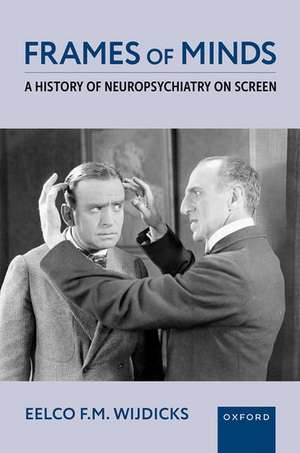Frames of Minds: A History of Neuropsychiatry on Screen
Autor Eelco F.M. Wijdicksen Limba Engleză Hardback – 31 ian 2025
Preț: 426.24 lei
Preț vechi: 579.79 lei
-26% Nou
Puncte Express: 639
Preț estimativ în valută:
81.56€ • 85.16$ • 67.50£
81.56€ • 85.16$ • 67.50£
Carte disponibilă
Livrare economică 04-10 martie
Preluare comenzi: 021 569.72.76
Specificații
ISBN-13: 9780197615898
ISBN-10: 0197615899
Pagini: 384
Ilustrații: 60 B&W Images
Dimensiuni: 163 x 238 x 22 mm
Greutate: 0.78 kg
Editura: Oxford University Press
Colecția OUP USA
Locul publicării:New York, United States
ISBN-10: 0197615899
Pagini: 384
Ilustrații: 60 B&W Images
Dimensiuni: 163 x 238 x 22 mm
Greutate: 0.78 kg
Editura: Oxford University Press
Colecția OUP USA
Locul publicării:New York, United States
Recenzii
The pleasures of film-viewing are the gateway to new understandings of the human mind. With this visionary and essential compendium, Eelco Wijdicks has done the deep work of illuminating connections that will alter the way we think.
Dr. Eelco Wijdicks again turns his authoritative gaze on the cinema of illness and medicine with a sweeping history that investigates how, from the earliest nickelodeons, the medium has treated the facts and known understanding of complicated conditions and disorders. Hollywood loves pain and neurosis, and Wijdicks examines a wide range of co-morbidity factors that suffuse the best and worst (famous and overlooked) movies. These range from substance abuse, depression, and schizophrenia to an examination of how the penchant for violence on the screen, especially from certain stars and filmmakers, might affect your mental health.
Psychiatry and film have long had an uneasy relationship. However, the celluloid's view has been often subverted by sensationalism, scaremongering, and the reification of stigma. Frames of Mind is as much a scholarly exploration of the history of mental health and film, as an invitation to imagine intersections. Dr. Eelco Wijdicks offers an entreaty toward an overdue agenda for cinema and psychiatry: one that replaces voyeurism and exploitation of some of society's most vulnerable with a shared commitment to better understand, empathize, and elicit meaningful action on their behalf. This volume will help us better appreciate, through film, not just the burdens of mental illness, but the promise of treatment, recovery, and reintegration.
In Frames of Mind, Eelco Wijdicks narrows his historical aperture to neuropsychiatric representations. This work not only better focuses our appreciation of how mental illness by actors, writers, and directors have shaped audiences' perspectives on these diseases, but also documents how filmmakers have appropriated depictions of mental illness as metaphors to dramatize their era's cultural chief concerns., Frames of Mind is a director's cut of brave scholarship exploring where the movie magic ends and medical misrepresentation begins for pressing issues and politically charged subjects like substance use, sanity, violence, and more.
Dr. Eelco Wijdicks again turns his authoritative gaze on the cinema of illness and medicine with a sweeping history that investigates how, from the earliest nickelodeons, the medium has treated the facts and known understanding of complicated conditions and disorders. Hollywood loves pain and neurosis, and Wijdicks examines a wide range of co-morbidity factors that suffuse the best and worst (famous and overlooked) movies. These range from substance abuse, depression, and schizophrenia to an examination of how the penchant for violence on the screen, especially from certain stars and filmmakers, might affect your mental health.
Psychiatry and film have long had an uneasy relationship. However, the celluloid's view has been often subverted by sensationalism, scaremongering, and the reification of stigma. Frames of Mind is as much a scholarly exploration of the history of mental health and film, as an invitation to imagine intersections. Dr. Eelco Wijdicks offers an entreaty toward an overdue agenda for cinema and psychiatry: one that replaces voyeurism and exploitation of some of society's most vulnerable with a shared commitment to better understand, empathize, and elicit meaningful action on their behalf. This volume will help us better appreciate, through film, not just the burdens of mental illness, but the promise of treatment, recovery, and reintegration.
In Frames of Mind, Eelco Wijdicks narrows his historical aperture to neuropsychiatric representations. This work not only better focuses our appreciation of how mental illness by actors, writers, and directors have shaped audiences' perspectives on these diseases, but also documents how filmmakers have appropriated depictions of mental illness as metaphors to dramatize their era's cultural chief concerns., Frames of Mind is a director's cut of brave scholarship exploring where the movie magic ends and medical misrepresentation begins for pressing issues and politically charged subjects like substance use, sanity, violence, and more.
Notă biografică
Eelco F.M. Wijdicks, MD, PhD is Professor of Neurology at the College of Medicine, Mayo Clinic. In 1992, he established the Mayo Clinic Neurocritical Care Program. He was the founding editor of Neurocritical Care, the official journal of the Neurocritical Care Society and has been named Honorary Member of the Neurocritical Care Society. He originated the FOUR SCORE coma scale and has over 1000 research papers, practice guidelines, topic reviews, book chapters, and editorials to his credit, as well as having single-authored, co-authored, and edited 35 books on neurocritical care. Dr. Wijdicks is also an attending neurointensivist in the Neurosciences Intensive Care Unit at Saint Marys Hospital, Rochester, MN, and is a Professor of the History of Medicine. He is the recipient of the Dutch Winkler medal, the Karis Award, and the Distinguished Educator Award. Dr. Wijdicks has studied medical representation in cinema and written scholarly film reviews for medical journals and haspublished on the interface between psychiatry and neurology. This book is part of a series on medicine in film and includes Cinema, MD, Neurocinema, and Neurocinema: The Sequel.
